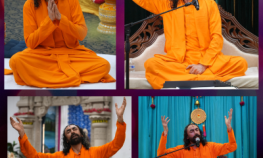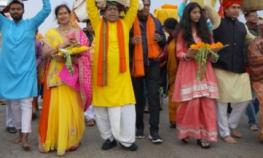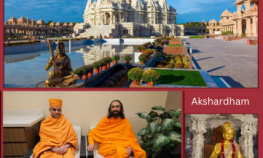Bhakti Shatak: Epitome of Divine Love
The Bhakti Shatak is an ocean of divine knowledge where the essence is drawn from many Vedic scriptures including the Bhagavad Gita, Upanishads, Brahma Sutra, and the Bhagwatam. As the title suggests, it contains 100 priceless gems to enable the spiritual aspirant to develop devotional sentiments toward God and make progress on the spiritual path. Composed by Jagadguru Shree Kripalu ji Maharaj in only ten days, it is a phenomenal text that provides the meaning of each verse to make it easier to understand the philosophical tenets.
Shree Maharajji has said that the Bhakti Shatak is like the Mansarovar of Braj where we are like the swans who absorb the sweet ras of divine love. The sweetness of the Braj Ras is incomparable because in Braj, the Supreme Lord Shree Krishna sheds His almightiness and becomes one of us. It is here that the Gopis make him dance for buttermilk or put little balls of cow dung on His face as a measure of the amount of work done in exchange for butter. This happens only when the devotees are totally selfless with not an ounce of selfish desire, not even for liberation. The land of Braj is where love dominates. All the residents in Braj are devotees of Shree Krishna who practice Raganuga Bhakti (i.e., loving devotional sentiments not dictated by rituals) instead of Vedic Bhakti (i.e., ritualistic, often devoid of devotion).
A couple of beautiful verses from Bhakti Shatak (see below) illustrate this point.
These verses inspire us to gain that divine knowledge of God that will help us to advance on the path of spirituality. It is important to reflect on the basic questions like: Who is God? What is my relationship with God? What is the purpose of my life?
Bhakti Shatak: The Means to Develop the Knowledge of God
The Bhakti Shatak starts by establishing the foundation that God, inclusive of Shakti and Shaktiman, are one even though they assume infinite forms to accomplish their infinite missions. Shakti and Shaktiman are the sources of infinite divine powers. However, for our purpose, which is to develop deep devotion for God, Shakti and Shaktiman are best worshipped in their sweet and loving form as Radha and Krishna.
Radha Rani is the divine energy or Shakti and it is Her compassionate grace that connects individual souls to Shree Krishna. This is the reason that rasik saints worship Radha Rani. She is the topmost devotee of Shree Krishna. Lord Krishna is the soul of all souls but Radha Rani is the soul of Shree Krishna. All Her shaktis manifest in various forms such as Mother Parvati, Durga, Mahalaxmi, etc. Thus, we should not discriminate between Shakti and Shaktiman in the same way as we do not differentiate the flower and its aroma, or heat and the fire.
Domains of God’s Shaktis
Shree Maharajji classified God’s infinite shaktis into three domains: Jeeva Shakti, Yogmaya Shakti, and Maya Shakti. Verses 3 to 7 of the Bhakti Shatak explain the core nature of these domains.
- Jeeva Shakti. The soul or jeeva is an ansh or a tiny fragment of God’s energy. It is a tathastha shakti or borderline energy, like the tat or bank of a river, one part of which is underwater and the half on the ground. The jeeva too has many shaktis like its source. However, all of its shaktis lie in a latent state because the jeeva has turned its back to God (i.e., become vimukh) and is overpowered by Maya Shakti. The soul has forgotten its true identity as the servant of God. Yet, God seated inside the soul, grants it eternality.
- Yogmaya Shakti. This Shakti of God is also referred to as the Para Shakti or Swaroop Shakti. It is God’s personal divine power and possesses an infinite amount of knowledge, love grace, wealth, etc. God does unimaginable things with the help of His Yogmaya Shakti. For example, by virtue of Yogmaya Shakti, God manifests His abode, His saukumarya, saushilya, saurasya – the charm of His personal form, the bliss of His divine love, His leelas, etc. Also, by virtue of Yogmaya Shakti, God keeps Himself hidden from us, takes care of all living beings, and keeps an account of our karmas. While all other shaktis reside under God, He himself resides under His Yogmaya Shakti.
- Maya Shakti. This is God’s material energy, Maya, the cause of all our worldly problems. Even though Maya is God’s insentient energy, it is so powerful that even elevated gyanis are unable to overcome its power. The goal of Maya is to keep troubling the souls through hardships until they completely detach from the material world and turn toward God (i.e., become sanmukh). Because Maya is God’s energy, it cannot be conquered through self-effort. Similarly, the mind is also made of Maya, thus it cannot be conquered without the grace of God. Therefore, we must perceive misery as divine grace that enables us to attach the mind and intellect to God.
The message behind this knowledge is that we have forgotten our true identity, thus we identify with the body. Due to this foundational mistake, we keep running after worldly pleasures but do not find permanent happiness anywhere. Our soul is divine, which is why it does not relish material pleasures. So, even though the jeeva, God (i.e., Brahm), and Maya reside in the same location, the jeeva has separated from God, that is, the consciousness is turned away from God, overpowered by Maya. Maya Shakti is like the darkness that makes us forget that only divine bliss will make us eternally happy. The only way then to find our way toward God is through bhakti of devotion.
Bhakti is a Shakti of God
Swamiji says, “Bhakti is difficult to describe and even God cannot throw light on bhakti; it is bhakti that throws light upon God.” Bhakti is also God’s energy and is non-different from God. Just as God is infinite, so is bhakti. The concept of bhakti has been described and explained by many saints but according to Swamiji, the most convincing description is that bhakti destroys ignorance and brings us into the light of knowledge (i.e., Bhanjanam Bhakti). Bhakti is the most powerful shakti of God. It is bestowed upon souls only through His grace as His prasad. The power of bhakti cannot be compared to anything, not even to tens of thousands of years of rituals or seva devoid of bhakti. This is because only bhakti attracts the grace of God. Therefore, we should understand how to practice bhakti to attract divine grace.
- Sadhan Bhakti. The preliminary stage of bhakti is called sadhan bhakti. It requires that we practice remembering God at all times – when we breathe in and out, while doing any work, by chanting His divine names, and by absorbing the mind through meditation or roop-dhyan. Focusing the mind on the names, forms, virtues, leelas, abodes, and saints of God, gradually helps to purify the mind. As Verse 19 of the Bhakti Shatak says, “The mind alone is the cause of bondage and liberation.”
In the spiritual realm, our thoughts are the most important. Any spiritual work without the engagement of the mind is like a mechanistic practice that has no relevance. Devotion must be filled with selfless love for God/Guru. We must beg for divine grace with true humility. The deep yearning to receive divine grace creates sentiments of love. Repeated contemplation that “He alone is mine,” will help to attach the mind to God and detach from worldly pleasures.
- Siddha Bhakti. When the material mind and intellect are completely purified, then God/Guru bestows Siddha Bhakti upon the soul. Siddha bhakti is unfathomable and thus indescribable. It is such an immense personal power of God that it cannot be cultivated through effort. Also, an impure heart cannot tolerate its power which is why souls need to be eligible first. Siddha bhakti can only be received through divine grace and only when the soul becomes eligible for it.
- Impact of Siddha Bhakti. In his Bhakti Darshan, Narad ji stated that after one is graced with Siddha bhakti, the soul is completely satiated and desires nothing in the material world. The power of Siddha bhakti is such that the devotee, graced with divine senses of knowledge and perception, sees, smells, hears, and experiences God everywhere.
While the sincere practice of sadhan bhakti attracts the grace of God, there are some conditions we all need to keep in mind to perfect our practice.
Bhakti Shatak: Pathway to Developing Divine Love
Sadhan bhakti is the stepping stone that will help to convince the intellect to create a deep longing for God. The basis of sadhan bhakti is the belief that as an ansh of God’s energy, our goal will be accomplished only through loving devotion and seva (i.e., service) to God. There are some principles to become eligible to receive divine grace.
- Nishkam Bhakti. It means to practice selfless devotion and love with no desire or expectation to receive anything in return from God/Guru. We should certainly not ask God for material things but also not ask for liberation. The love should be unconditional and the desire should be to please Him through seva. A beautiful verse from Bhakti Shatak (15) illustrates this point (see below).
- Nirantar Bhakti. It means to practice devotion constantly or at all times. This would be possible only if we remember God at all times (Bhakti Shatak, verse 18 below) including when we perform any action whether it is worldly or devotional (i.e., karm yog; Bhakti Shatak, verse 84 below).
- Ananya Bhakti. It means to attach the mind exclusively to God/Guru or anywhere in the divine realm without exception. We must relinquish all kinds of worldly desires including that of liberation. This is possible only if we believe in the wisdom that God alone is our true relative and that all other relationships are temporary (see Bhakti Shatak, verse 45 below).
- Personal Relationship with God. When we believe that God alone is our true relative, then we can strengthen this belief by practicing loving devotion in any of the bhavs, for example, relating to God as his servant, friend, child, or beloved. Whichever bhav is practiced, the ultimate desire is to serve God for His pleasure (see Bhakti Shatak, verse 74).
- Relinquish Karmkand. To practice true devotion and love for God/Guru, it must be devoid of ritualistic processes and focus exclusively on bhakti. In other words, bhakti should be of foremost importance rather than the Vedic procedures. Even in the Bhagavad Gita (chapter 5), Swamiji discussed the importance of bhakti vis-à-vis the mundane execution of rituals due to its dynamism and the depth of devotional sentiments.
Practicing these five processes will make us eligible to receive divine grace. When the mind automatically connects to God/Guru without effort, souls progress to bhav bhakti – a higher level of sadhan bhakti. Swamiji has beautifully described the symptoms of bhav bhakti in His lectures.
Symptoms of Bhav Bhakti
- Elimination of Mental Afflictions. The power of bhakti is such that even when there is cause for anger, envy, or hatred, the mind remains calm. Negative emotions lie latent within us and surface when provoked. However, when the mind is attached to God and detached from the world due to bhakti, it exercises self-control and does not let negative emotions surface.
- Increase in the Value of Time. The realization that bhakti is the only way to break the cycle of life and death, souls do not want to waste any time on frivolous things like gossip or material allurements. They productively utilize all their time in loving remembrance of God.
- True Detachment. The mind is detached not only from worldly allurements but also outcomes of actions. All types of outcomes – success or failure are taken in stride. Each is non-different from the other. This implies that the intellect is constantly aware of the goal – God-realization; anything that takes it away from the goal is considered irrelevant and to be shunned. Thus, the bad behavior of others does not bother souls focused on the goal.
- Maan-shunyta. This is the internal state of freedom from the desire for recognition, praise, prestige, status, respect, etc. This can happen only when one becomes humble from the repeated practice of sadhan bhakti. Internalizing and chanting the verse by Chaitanya Mahaprabhu “Trinadapi sunichena tarorapi sahishnuna, Amanina maanadena kirtaniya sada Harih,” will enable us to reach the state of Maan-shunyta when coupled with divine grace.
- Ashabandh. This is the internal state and a symptom of bhav bhakti. Here, a devotee has complete faith in attaining the divine goal. Deep and intense bhakti leads to such faith. When the faith is based on the thought, “I have no means to reach God but for His grace. One day He will grace me because He is patit-pavan.” Such a firm faith truly attracts the grace of God/Guru.
- Samudhkantha. This is an intense longing to attain God that is ever-increasing. It is a very high state of spiritual bliss – “Prem Mein Purnima Nahin.”
- Intense Desire and Bliss from Chanting God’s Glory. The devotee experiences immense yearning to glorify God through kirtans and experiences enormous bliss while chanting. The heart does not want kirtans to ever end. Everything associated with God – His names, forms, virtues, pastimes, abodes, and saints, become very dear to the soul. The mind becomes very attached to God and finds a lot of bliss in listening to God’s divine leelas.
Savor the Bliss of Bhakti Shatak at the Spiritual Retreat & Family Camp
We all have a tremendous opportunity to savor the bliss of sweet, sublime, and blissful verses of the Bhakti Shatak narrated by Swamiji at the Spiritual Retreat & Family Camp from July 4 to 10, 2023.
Swamiji’s inimitable style of conferring divine knowledge and bliss upon all the devotees and participants cannot be described in words. Savor the bliss of listening to Swamiji chant the beautiful Bhakti Shatak verses. Feel inspired to practice devotion in the most exquisitely beautiful location, the Radha Krishna Temple of Dallas (Allen), JKYog’s official Headquarters. Listen to this beautiful video lecture from a previous Family Camp where Swamiji covered verse 21 from Bhakti Shatak.
We encourage devotees to register for the Family Camp if not already done. This is one of the rarest opportunities to directly listen to Swamiji’s divine lectures and relish the bliss our soul has been seeking since endless lifetimes.
#Bhakti Shatak #Divine Love #BrajRas #SpiritualRetreat&FamilyCamp #JKYog #RadhaKrishnaTempleOfDallas #KripaluJiMaharaj #SwamiMukundananda
Videos

















